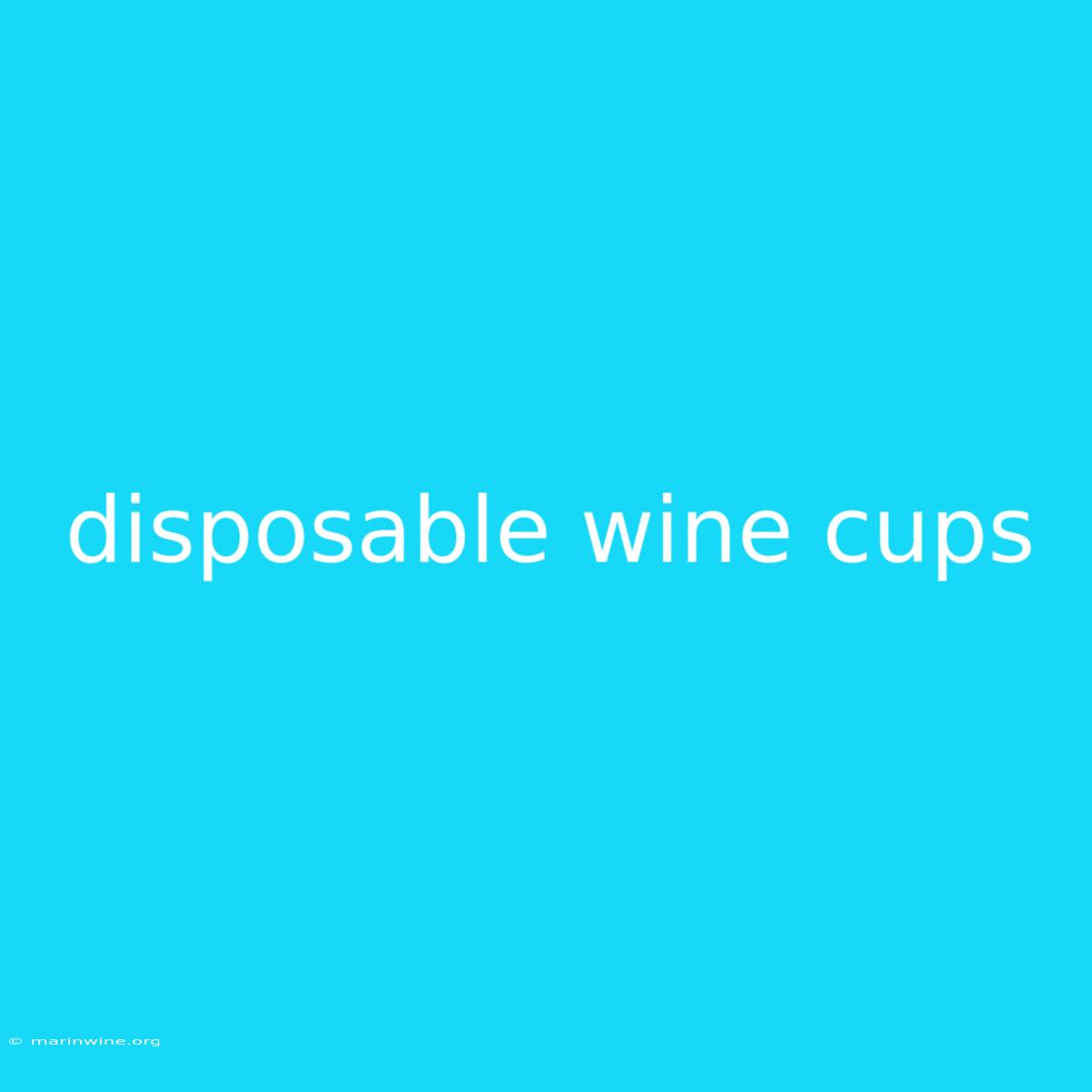Disposable Wine Cups: The Perfect Solution for Your Next Gathering?
Editor's Note: Disposable wine cups are becoming increasingly popular for events and gatherings. But are they really the best choice? This article explores the pros and cons of using disposable wine cups, helping you make an informed decision for your next celebration.
Why This Matters: Disposable wine cups are gaining traction in a world concerned with sustainability and convenience. Understanding the benefits and drawbacks of these cups is crucial for making informed choices about your event planning and environmental impact.
Key Takeaways of Disposable Wine Cups
| Benefit | Drawback |
|---|---|
| Convenience | Environmental Impact |
| Cost-effectiveness | Aesthetics |
| Versatility | Durability |
| Hygiene | Limited Wine Experience |
Disposable Wine Cups
Disposable wine cups offer convenience, cost-effectiveness, and hygiene for events and gatherings. They're widely available in various sizes and materials, catering to different needs and budgets.
Key Aspects:
- Materials: These cups are typically made from plastic, paper, or compostable materials. Each material offers its own advantages and disadvantages.
- Durability: Disposable wine cups are generally designed for single-use, lacking the durability of reusable glassware.
- Aesthetics: While some disposable wine cups offer attractive designs, they often lack the elegance of traditional wine glasses.
- Wine Experience: Disposable wine cups can affect the taste and aroma of wine due to the material's interaction with the beverage.
Material Considerations
The material of disposable wine cups significantly impacts their environmental impact and wine experience.
Plastic:
- Pros: Cost-effective, readily available, durable.
- Cons: Non-biodegradable, contributes to plastic pollution, can leach chemicals into wine.
Paper:
- Pros: Biodegradable, recyclable, often coated for improved durability.
- Cons: Less durable than plastic, prone to moisture absorption, can affect wine taste.
Compostable Materials:
- Pros: Biodegradable, eco-friendly, often made from plant-based materials.
- Cons: Higher cost, limited availability, requires proper composting facilities.
Environmental Impact
The environmental impact of disposable wine cups is a significant concern. While some options are compostable, the majority end up in landfills or contribute to plastic pollution.
- Waste Generation: Disposable cups contribute to a significant amount of waste, especially in large events.
- Landfill Pollution: Plastic cups take hundreds of years to decompose, polluting landfills and releasing harmful chemicals.
Alternative Solutions
To reduce your environmental impact, consider sustainable alternatives to disposable wine cups.
- Reusable Glasses: Reusable glassware offers a stylish and environmentally friendly option.
- Reusable Cups: Reusable cups made from durable materials can be personalized and used repeatedly.
- Compostable Cups: Choose compostable cups from reputable brands with proper composting facilities.
FAQ
Q: Are disposable wine cups good for wine tasting events?
A: While disposable wine cups offer convenience, they can impact the taste and aroma of wine, which is crucial for a proper tasting experience. Reusable glasses are generally preferred.
Q: How can I dispose of disposable wine cups responsibly?
A: Follow local recycling guidelines. Plastic cups are often not recyclable, while paper cups may be. Compostable cups need to be sent to a commercial composting facility.
Q: Are disposable wine cups suitable for hot beverages?
A: Some disposable cups are designed for hot beverages, but it's crucial to check the material's heat resistance to avoid burns.
Tips for Using Disposable Wine Cups
- Choose sustainable options: Opt for compostable or recyclable cups whenever possible.
- Reduce waste: Encourage guests to refill their cups rather than using multiple disposable ones.
- Promote recycling: Provide clear signage and bins for recycling or composting.
- Consider alternative options: Explore reusable cups or glassware for a more eco-friendly solution.
Summary of Disposable Wine Cups
Disposable wine cups offer convenience and cost-effectiveness for events and gatherings. However, their environmental impact and potential effect on wine quality should be considered. By exploring sustainable alternatives and implementing responsible disposal practices, you can minimize the environmental footprint of your next celebration.
Closing Message: The convenience of disposable wine cups is undeniable, but their environmental impact should not be ignored. By making informed decisions about your event planning and embracing sustainable practices, you can enjoy your gathering while reducing your footprint on the planet. Let's raise a glass to a more sustainable future!

